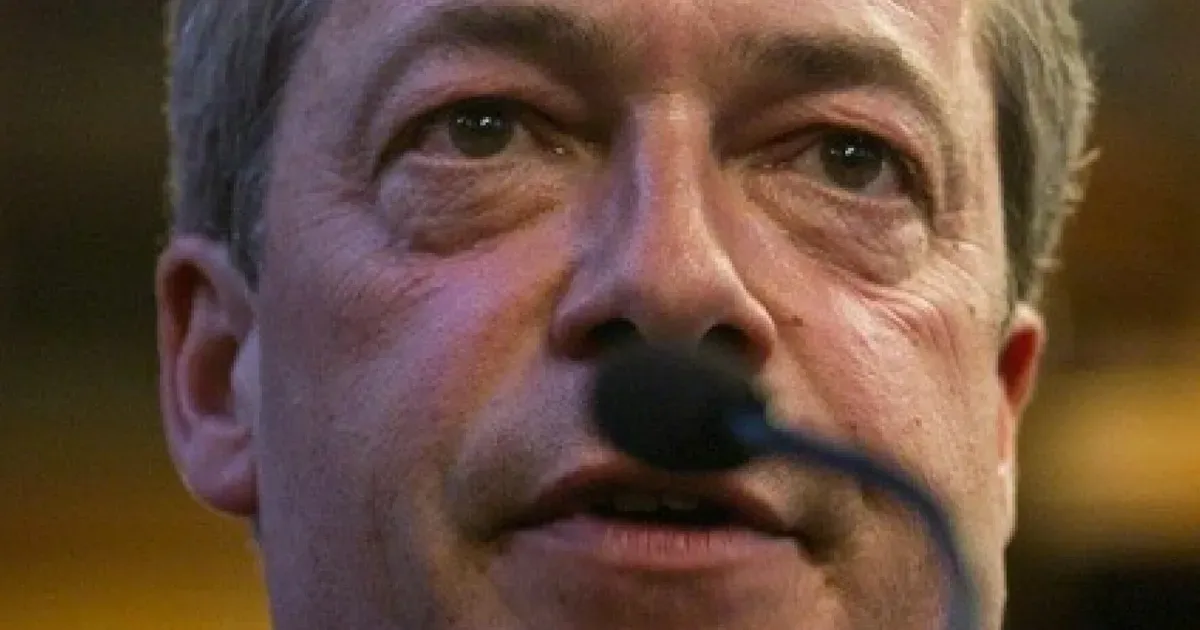Nigel Farage and the Criteria of Fascism: A Political Comparison
An exploration of Nigel Farage’s rhetoric and policies through the lens of fascism’s defining traits — past and present.

You may have seen Nigel Farage described as a fascist — perhaps in tweets, headlines, or conversations. You may also have dismissed this as political name-calling, and a way for elitist critics to attack a populist figure. But for those who prefer clarity of knowledge, this article takes a step back and asks: what does “fascism” actually mean, and how do Farage’s public positions compare with scholarly definitions?
For those that don't; well, they were probably offended by how much the first sentence resonated with them and have already closed this article.
What is Fascism?
There are a few definitions of fascism, which are all rooted in a hierarchy of ethnic priority in relation to nationhood. In simpler terms, your race ties you to your nation, and other ethnicities only dilute these ties.
Firstly, Fascism often intertwines ultranationalism with authoritarianism and a racialized vision of national identity. The phrase 'blood and soil' (Blut und Boden), central to Nazi ideology, was popularized by Richard Walther Darré—Nazi Minister of Agriculture and a key architect of racial agrarianism. This concept ties ethnicity ('blood') to territory ('soil'), forming a doctrine that justified exclusion and violence in the name of cultural purity.
To further this, Roger Griffin’s work on fascism highlights that the “fascist minimum” is understood as applying this ultranationalist view as a vision for the future, through palingenesis (reproducing mythic national ancestors’ characteristics). Mussolini placed more emphasis on this, whereas the Nazi’s honed in on the idea of a hierarchy of race more.
Perhaps delving a bit deeper into fascism's main characteristics is Lawrence Britt's definition, which outlines 14 key pillars:
- Powerful and Continuing Nationalism
- Disdain for the Recognition of Human Rights
- Identification of Enemies/Scapegoats as a Unifying Cause
- Supremacy of the Military
- Rampant Sexism
- Controlled Mass Media
- Obsession with National Security
- Religion and Government are Intertwined
- Corporate Power is Protected
- Labor Power is Suppressed
- Disdain for Intellectuals and the Arts
- Obsession with Crime and Punishment
- Rampant Cronyism and Corruption
- Fraudulent Elections.
This video helps in showing how Fascism looks in practice using Mussolini's Italy and of Course, Nazi Germany as case studies.
So... Does Farage fit the bill?
First, it is important to recognise that Nigel Farage has yet to seize national power, meaning that many authoritarian practices cannot be proven. Therefore, we must explore policy detail, language, and propaganda in order to assess these claims.
If we apply this to the "blood and soil" definition of fascism and it's relationship to Reform UK's leader, we must assess the narrative he has molded. Nigel Farage’s political rhetoric frequently aligns with the fascist concept of “blood and soil” (Blut und Boden), which intertwines ethnic identity with territorial belonging. While Farage does not employ overtly racial language, his discourse often constructs a dichotomy between "native" Britons and migrants, particularly Muslims, portraying the latter as cultural threats. Farage has used an anti-immigrant sentiment to argue that multi-culturalism doesn't work, and in allowing migration, it erodes British identity.
Britt's Characteristic
- Powerful and Continuing Nationalism (High)- Strong Nativist Retoric; emphasis on sovereignty during Brexit campaign, and heightened levels of British exceptionalism, especially from a colonial perspective.
- Disdain for Human Rights (Hight)- Advocates for Leaving ECHR; dismissive of asylum protections; policy to limit immigrant access to healthcare.
- Identify Enemies/Scapegoats (High)- Frequent targeting of Migrants, Asylum seekersm and "woke elites" (Mainly democratic institutions like the Judiciary).
- Sumpremacy of the Military (Low-Moderate)- Advocates for increased military spending at the expense of Foreign Aid but this is pretty much Parliamentary consensus across, Labour, Reform UK, and the Conservatives.
- Rampant Sexism (Moderate-High)- amongst dodgy remarks justifying Trump's comments about groping women, Farage has previously stated his opposition to gay marriage, and has called for stricter abortion rights for women
Farage displaying his views on Homosexuality
- Controlled Mass Media (Moderate)- Leverages media access (e.g. GB News), but no state control or restriction of press freedom. An argument can be made that he has a monopoly on the media due to Far-Right Moguls like Rupert Murdoch, and Jon Harmsworth ushering him to electoral supremacy. An argument can be made that a monopolised free press that publishes only in the interests of those that own the newspapers aren't Free.
- Obsession with National Security (Moderate) - Strong focus on borders, immigration control, and "law and order" narratives.
- Religion and Government Intertwined (Low)- Cherry-picks Christianity as part of UK culture when seeking to scapegoat migrants as having "alien values".
- Corporate Power Protected- Pro-Privatisation stance; NHS criticisms suggest neoliberal leanings, but not explicit corporatism.
Nigel Farage admitting he wants to privatise the NHS
- Suppression of Labour Rights (Moderate– High)- Voted against the Workers Right's bill in Parliament which protects workers against, Fire and Rehire, Eradicated 0-Hours contracts and allows sick pay from day 1.
- Distain for intellectualism or the Arts (Moderate)- Rhetoric dismisses academics, “experts,” and “woke” cultural institutions as part of his populist rhetoric.
- Obsession with Crime and Punishment (Moderate)- Reform UK’s crime and punishment pledges focus on zero-tolerance policing, tougher sentencing (including mandatory life for repeat offenders), expanded prison capacity, and fast-tracked deportations, underpinned by increased funding and a hardline stance on law and order.
- Rampant Cronyism- Consistently holds talks with crypto moguls, and financial firms. Also regularly works with "nomad capitalists", who pay him £40,000/hour to help tax avoiding millionaire/billionaire's obtain international passports.
- Fraudulent Elections (Low)- While Reform UK are not in power, their influence is mainly spread through sensationalised and misleading (often false) information. Just this week they announced they would cut DEI spending by £7bn in the Civil Service, yet the amount spent on DEI across 500 jobs out of 500,000, is around £27m in total...
Conclusion: A Warning, Not a Verdict
It would be legally and intellectually careless to brand Nigel Farage definitively as a fascist — fascism, after all, is not just a set of policies or speeches, but a totalising political system rooted in power. Farage is not (yet) in such a position. However, when we step back and assess his rhetoric, policies, and political messaging through the lens of historically grounded definitions — such as Lawrence Britt’s 14 characteristics or the ethno-nationalist doctrine of “blood and soil” — striking parallels do emerge.
This is not to claim certainty, but to issue caution. Populist movements like Reform UK thrive on public anger, national myths, and scapegoating — fertile ground from which more overt authoritarianism can grow (See Orban's Hungary, Trump's U.S or Modi's India). Understanding the historical patterns of fascism isn't about hyperbole; it’s about recognising where certain roads lead if left unchecked. History doesn’t repeat — but it often rhymes.

If you would like to find out why Populism is on the Rise in Europe follow the link to another article!

